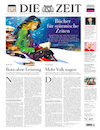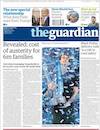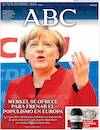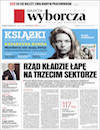This press review has been translated from the French by Simon Pickstone
Die Zeit’s Robert Misik is in two minds regarding the new candidacy of Angela Merkel, whom he sees as one of the main causes of the current global economic crisis. But, he thinks, it is precisely for this reason that she has a major historic challenge to overcome during her possible fourth term in office:

With Trump’s election, in the middle of the chaos from Putin, Brexit, war [...], Merkel must take on an entirely unexpected new role: the New York Times called her ‘the last person defending the liberal west’ [...]. But it is all the same paradoxical that it falls on Merkel to save the western world. Because the German Chancellor [...] is one of the key people responsible for the current situation, where we really have to defend pluralistic democracy. The austerity politics we find in Europe, initiated by Germany, consists of reducing incomes for normal people [...] and is one of the causes of the malaise we currently find ourselves inhabiting [...]. Merkel well knows that she is identified with this politics. And that changing course would go hand in hand with an admission of guilt for having made a huge error. And, as we well know, this is not an easy thing for politicians. But if there is anyone who has mastered the art of slowly and steadily changing policies, adapting them pragmatically and doing the opposite of what you previously said, without any dramatic gestures, as if nothing were amiss, it is truly Angela Merkel.
Receive the best of European journalism straight to your inbox every Thursday
Angela Merkel wants more, argues Anja Maier, columnist for Die Tageszeitung, but she reminds readers that Germany has changed over the last 11 years of her administration and it is principally Alternative für Deutschland that will stand in the way of her reelection –

The revolution has therefore not happened. Angela Merkel wants to stand again as Chancellor [...]. This is not so surprising. Anyone who has seen her work over these last few months would notice it: not only does she love being Chancellor but she still has lots of initiatives. She is not lacking in ideas. And yet it will not be a shoe-in for her. [...] The AfD’s strategists are likely already coming up with their first slogans: ‘Renewal instead of immobility’ -- something of that sort. [...] So the establishment parties and their representatives can now show what politics can say for them. They must make proposals, say what they want to change from 2017. Employment, taxes, education, trade, ecology and development -- these are the themes that ultimately concern everyone. But many people who have lost it from sight.
“If Angela Merkel wins the 2017 election and stays the full term, she will have governed Germany for 16 years, making her, alongside Helmut Kohl, the longest-serving German leader since Bismarck.” writes The Guardian in its unsigned editorial the day after she announced her candidature

There are good reasons for Mrs Merkel’s decision. In uncertain times, it is reassuring that the leader of Europe’s most important nation holds to the principles of freedom, openness and democracy that have helped to rebuild and reunify postwar Germany. She got plenty wrong about the migration crisis, but her liberal approach contrasted with the anti-migrant upsurge elsewhere in Europe. Her decision to stand up to Vladimir Putin in Ukraine has checked some Russian ambitions. If Italy is forced out of the eurozone or Marine Le Pen is elected in France, Europe may be better able to ride out the challenge with her at the helm. [...] But the Germany and EU that Mrs Merkel may lead at the end of this decade are very different from the Germany and EU of 2005, when the glow of European post-cold-war stability and growth still applied. They must adapt again if they are to prosper. That means forms of European cooperation – hopefully including Britain – that provide Europeans with hope and security not fear and instability. Germany cannot carry the burden of achieving this alone. [...] If Mr Trump allows Mr Putin to have his way in eastern Europe and the Baltics, German coalition politics may mean Mrs Merkel will struggle to stand in Russia’s way. [...] It may be Mrs Merkel’s fate to stop things getting any worse, not resolve them. That is not to be sneezed at. Yet she can do better. She thinks in global terms. Since she is running again, she should make use of her practicality and trust to offer an achievable vision for Germany and Europe. This needs new thinking, not old.
Regarding Merkel’s fourth nomination as candidate for Chancellor, the conservative daily ABC praises her leadership of the German government over the last few years, because “a certain talent is needed [...] to lead without coming across as arrogant.” For ABC, Merkel

has asserted herself at the head of Europe’s political leadership [...]. Naturally, her tenure has seen controversial decisions, like her excessive rigour in dealing with the Greek crisis, her magnanimity in welcoming refugees and so on. But at any rate, you cannot criticise her for a lack of leadership. Merkel has never shied away when most other European governments were paralysed or incapable of reaching an agreement. Germany is the cornerstone of stability and progress in Europe, and not just for its economic and demographic clout. [...] The years to come may well be very complicated for us Europeans if the tide of populist and demagogic nationalism continues rising. Merkel and her talent will be essential to us.
Tomasz Bielecki, the columnist for Gazeta Wyborcza, argues that “Chancellor Merkel is the only European leader with enough clout to stop populism, fight to maintain the unity of the EU and to stand up to the Kremlin.” He judges that, on the whole, the status quo in Germany presents more advantages than drawbacks. He writes, “her decision to run for a new mandate in 2017 is good for Poland. The series of events in Europe and the US is so troubling that we should reinforce our ties to German despite the tensions between the Law and Justice government and Berlin.” Angela Merkel is aware of the special role her country has played in Europe. Nevertheless, he argues German hegemony in Europe is not a bed of roses:

at the start of the eurozone crisis, the Germans adopted a budgetary policy that was inadequate because it was too draconian. But, more importantly, Merkel cannot stay at the head of the country forever and we don’t know what the policies will be of her successors in a decade’s time. Preserving the foundations of European integration is therefore essential for Poland and Germany today. The EU institutions, in particular the Commission, must therefore preserve their regulatory roles within the Union, partially limiting the power of the largest member states.
“Over the last two and a half years, Merkel has mobilised and maintained Europe’s cohesion regarding Moscow following its annexation of Crimea,” notes in Corriere della Sera. For the columnist,

it was unthinkable to leave at the moment when the new US President Donald Trump could seek an agreement with Vladimir Putin that would place the EU in the worst crisis in its history. Until now, she has acted according to her sense of responsibility. Now there is something more risky at work: the wish to defy those who, riding the wave of the refugee crisis, have predicted the Frau Merkel would not be the Chancellor at the end of 2016. And the fact no successor has been found in the CDU, the largest party in the country that will very likely lead the government after the elections of Autumn 2017. The choice of running as candidate again is therefore risky, but virtually inevitable. Will she win? For now, the polls say yes, but they are not clear on what alliances she will have to make to establish a government. What is certain is that it will be a new Angela Merkel. Her refugees policy has changed her political stripes; she no longer takes a wait-and-see approach. And the thought of not having to run for a fifth term in 2021 will make her bolder. Just a little.
Was this article useful? If so we are delighted!
It is freely available because we believe that the right to free and independent information is essential for democracy. But this right is not guaranteed forever, and independence comes at a cost. We need your support in order to continue publishing independent, multilingual news for all Europeans.
Discover our subscription offers and their exclusive benefits and become a member of our community now!












